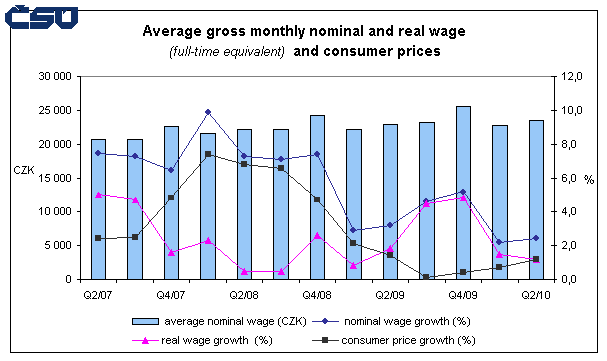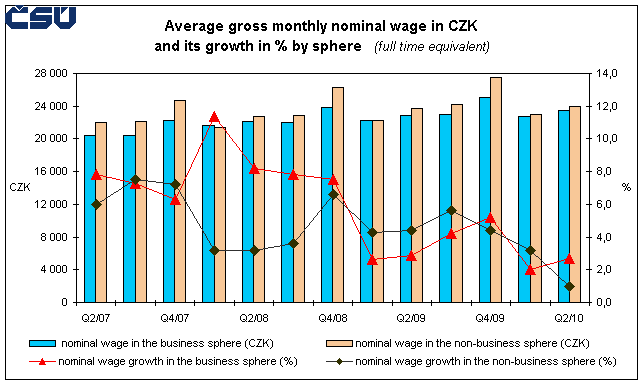Analysis of the development of average wages of employees - 2 quarter
06.09.2010
Code: q-3134-10
The development of wages is still affected by the lingering crisis in the Czech labour market. The employment rate measured by the registered number of employees (FTE) compared to the same period of the previous year dropped by 2.0%, i.e. by 78 thousand. However, the recent period has already suggested stabilization or return to growth as we are witnessing mainly in industry. By contrast, in some market services impacts of the crisis did not show up until this year ('professional, scientific and technical activities' or 'accommodation and food service activities’) and in the state sector we observe first effects of the austerity measures.
As regards the number of hours worked, industry and transport, i.e. sectors most affected by economic crisis, recorded the highest increase of overtime hours by one third, year-on-year, which indicates that bad times for those sectors are over. Unfortunately, it is not true in other sectors.
In wages we observe almost depleted structural influences connected with dismissals which markedly distorted indices to a growth of the average per one employee in the last year; now, the indices depict the actual wage development more exactly, however, the effect of reducing morbidity persists. The growth of average nominal wages (2.4%) was the second lowest since 2000 and only by 0.2 percentage point higher than in Q1 2010. At the same time, the volume of wages and salaries remained almost unchanged (+0.3%).
The real wage development, besides the nominal wage growth, was still affected by a relatively low growth of the price level (inflation) measured by the consumer price index. In Q1 2008 the inflation hit its top (7.4%) and has been falling since to reach its minimum in Q3 2009 (0.1%), in Q4 it increased slightly (to 0.4%), in Q1 2010 the inflation increased by 0.7% and in Q2 by 1.2%.
The total real wage in Q2 2010 increased, y-o-y, by 1.2%. The business sphere saw an increase of the real wage by 1.5%, y-o-y, while the non-business sphere recorded a 0.2% drop. The non-business sphere, which involves more employees with a higher level of education, has a slightly higher average salaries compared to the business sphere in the long term, but it also has less differentiated earnings and their development is not so turbulent.
Graph 1

Graph 2

The minimum wage showed no changes since January 2007 and accounts for CZK 8 000.
* * *
Over the first half-year of 2010, the average nominal wages increased by 2.3% both in the entire Czech national economy and in the business sphere. The non-business sphere registered an increase by 2.0%. Taking into account the consumer price index of 100.9%, the real wage increased by 1.4%.
In terms of individual economic activities a year-on-year nominal drop of the average wage was reported in industries (CZ-NACE sections) where wages are very high for a long time: 'professional, scientific and technical activities' (by 3.7%) and 'financial and insurance activities' (by 0.2%). A slight decrease (by 0.1%) was also recorded in 'transportation and storage' where the average nominal wage oscillates around the nationwide level. By contrast, after a slump in the last year, a significant growth of average wages was recorded in 'mining and quarrying' (by 8.2%), so that it came slightly above the level of the first half-year of 2008. Permanently growing is the average wage in 'human health and social work activities' (by 6.0%). The third place belongs to 'arts, entertainment' and recreation' with 4.5%; no other industry recorded more than four percent growth of average wages.
Contact: Information Services Unit - Headquarters, tel.: +420 274 056 789, email: infoservis@czso.cz










